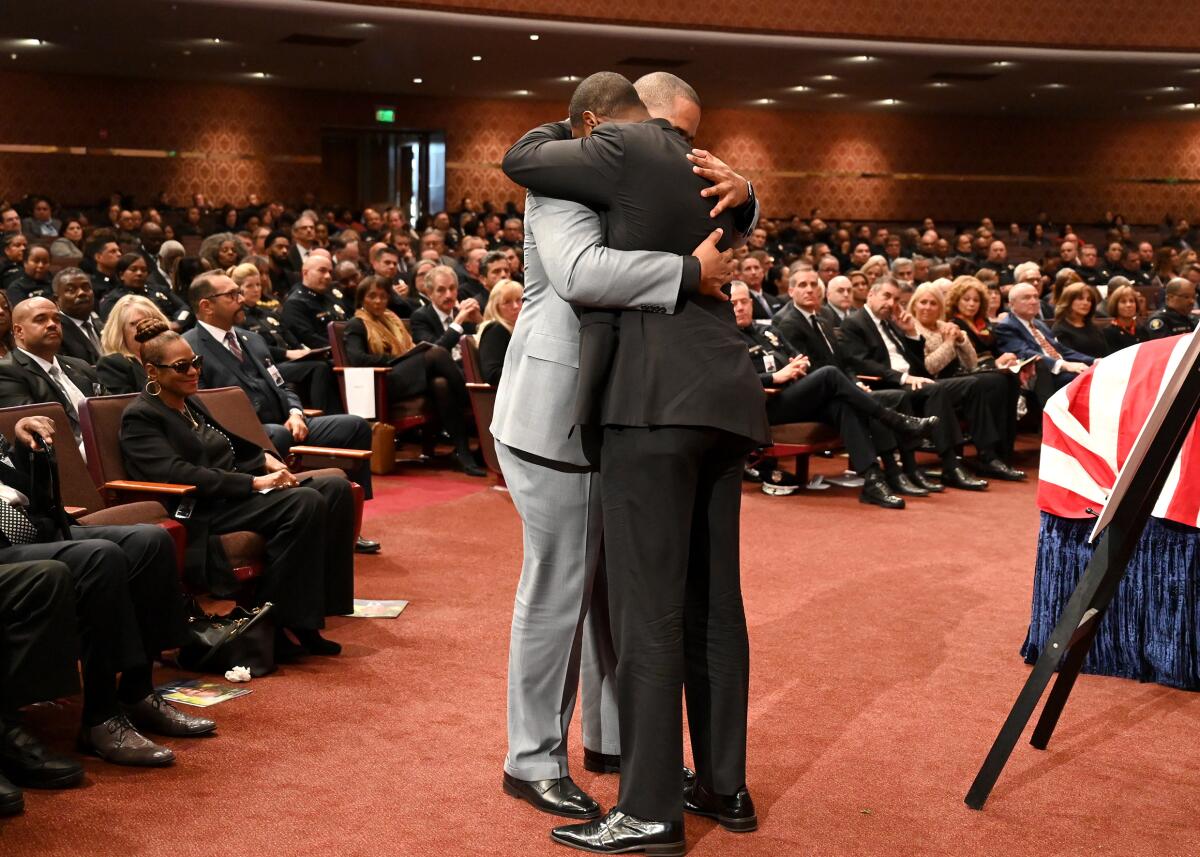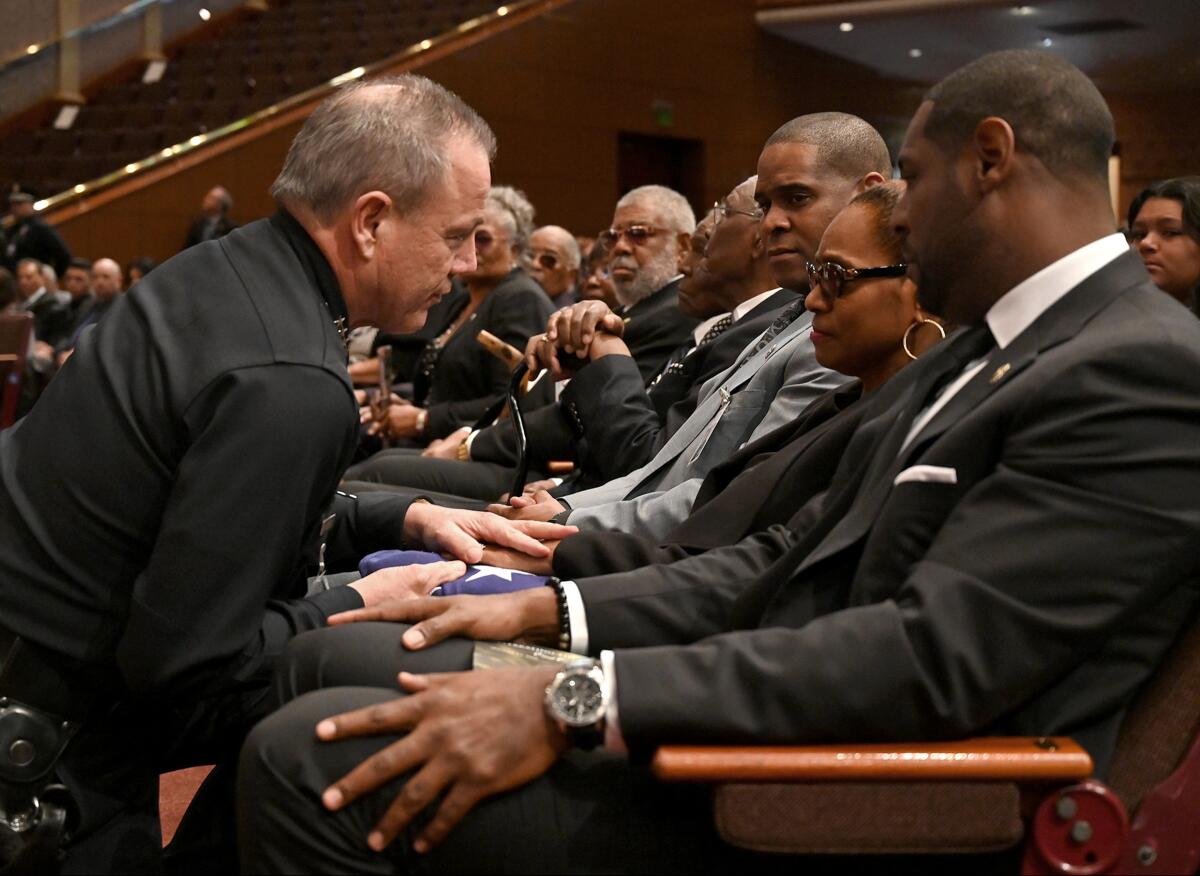Earl Paysinger, longtime LAPD leader, dies at 64

- Share via
Earl C. Paysinger, a pillar of the Los Angeles Police Department and a respected leader in South L.A. who was credited with driving down crime by focusing on community partnerships, died Monday. He was 64.
Paysinger was with his family at a hospital when he died from lung cancer, according to LAPD Cmdr. Al Labrada.
Chief Michel Moore, who visited Paysinger on Monday morning at the hospital, praised his former colleague in a statement as “a man with a tireless work ethic who knew cops count. Who cared deeply for our community’s youth. A professional and family man I respected for his dedication to his family, beliefs and convictions.”
During 41 years with the LAPD, Paysinger rose through the ranks from patrol officer to first assistant chief, the second-highest-ranking post in the department. He was instrumental in Chief William J. Bratton’s success in reducing violence, first as deputy chief of the South Bureau and later as head of operations. Inside the department he could be a stern task master, delivering incisive lines of questioning that startled captains.
One of the LAPD’s highest-profile black leaders, Paysinger was an advocate for diversifying the force and helped quell friction that arose between officers and city residents, particularly in South L.A.
In that quarter of the city, where tensions with police precipitated the Watts riots in 1965 and unrest after the 1992 acquittals of the officers involved in the beating of Rodney G. King, Paysinger was among the leaders who regularly met with residents, listened to their concerns and pledged full investigations into alleged misconduct.
Andre Birotte Jr., then an LAPD inspector general, praised Paysinger in 2006 for devoting time to residents after multiple high-profile confrontations with police riled the community and threatened mayhem.
“My humble opinion is Earl has saved the city from burning down several times,” Birotte, now a federal judge in L.A., told The Times.
Community activist Najee Ali said he was a teenager 35 years ago when he first met Paysinger “in an era where there was tremendous tension between the black residents of South Los Angeles and the LAPD.”
“Paysinger was one of the few officers our community trusted,” Ali said.
Paysinger grew up in Harbor City, where his father worked as a cement mixer and his mother cleaned houses. Finding limited opportunities in the late 1950s and ‘60s, Paysinger said he found sanctuary as a kid in the Royal Rangers, a program for boys at a church.
“They didn’t care who I was or where I came from,” he told a USC publication. “They just opened up their arms and welcomed me in.”
In the 1990s, Paysinger made the news after police realized his name was on the gun held by O.J. Simpson during the infamous televised Bronco chase. Paysinger, who worked off-duty as a private security guard for the owner of the Los Angeles Raiders, told investigators that he purchased the gun for Simpson while providing security for the former star running back. In 1995, a high-ranking police source told The Times the gun purchase did not amount to misconduct.
Later in his LAPD career, Paysinger helped transform the department’s cadet program, which provides more than 8,000 children with programs on academics and character building. Participants in the program have a 91% graduation rate from high school, with many opting to attend college or join the LAPD.
Paysinger retired from the LAPD in 2016 and took a position at the University of Southern California as the vice president for civic engagement. USC President Carol Folt told community members gathered for a holiday party Monday evening about Paysinger’s death, since he was expected to be present for the party.
In a statement, USC said it was saddened by his death. “His love of our city was invaluable as he worked to strengthen USC’s partnerships with community leaders to improve our neighborhoods. USC and Los Angeles are better today because of him.”
He is survived by his wife, Miguel, and two sons.

More to Read
Start your day right
Sign up for Essential California for the L.A. Times biggest news, features and recommendations in your inbox six days a week.
You may occasionally receive promotional content from the Los Angeles Times.








